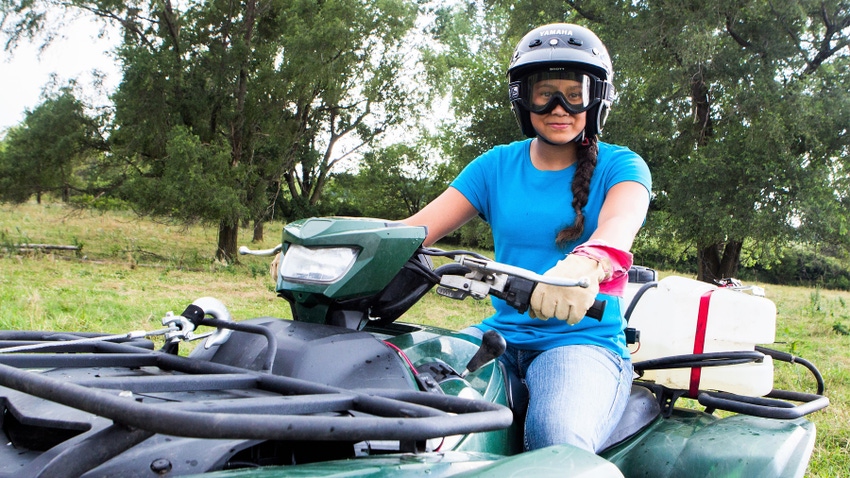February 23, 2024

Editor's note: For a Spanish version of this story, click "Download now" at the top or bottom of this page.
by Ellen Duysen
All-terrain vehicles and utility task vehicles have become the workhorses on many farms and ranches. Used to herd livestock, transport equipment and maintain the property, these off-road vehicles require responsible operation to prevent incidents.
Although considered a safer alternative because they have a roll cage and seat belts, UTVs can be hazardous if seat belts are not used and if overloaded.
In 2023, there were 291 ATV and 27 UTV fatalities in the U.S., with many of these related to work in agriculture. In 2019, ATV incidents resulted in an estimated 95,000 emergency room visits. Some guidelines to reduce the risk of injury, death and possible liability are outlined below:
Provide training. All operators on your farm or ranch should undergo comprehensive safety training before using ATVs or UTVs. Training programs should cover vehicle operation, safety gear usage and emergency procedures. Keep a record of this training. Training resources are available at unmc.edu/publichealth/cscash.
Wear personal protective equipment. Wearing appropriate protective gear — including helmets, gloves, goggles and sturdy footwear — will significantly reduce the risk of injury during a rollover or collision. The most common injuries are to the head and neck. Wearing a helmet can reduce this risk.
Inspect and maintain equipment. Regular inspection and maintenance are crucial for safe operation. Check brakes, tires, lights, oil, gas and other essential components before each use.
Keep children off adult-sized equipment. Minimum age requirements for operators are based on the ATV and UTV's size and weight. Young and inexperienced operators should only use vehicles appropriate for their age and skill level and only with supervision by an experienced adult.
Each year, more than 90% of children killed on ATVs were operating the vehicle or were a passenger on equipment that was too large and powerful for them. A child is no match for an ATV that has rolled on them, with the average 10-year-old boy weighing 54 to 102 pounds and an adult-sized ATV weighing 400 to 630 pounds.
Do not overload and keep the load balanced. Adhere to weight limits specified by the manufacturer to prevent overloading, which can compromise vehicle stability and lead to rollovers.
No passengers on ATVs. Most ATVs are made for one person. Passengers can affect vehicle stability and compromise safety. Many of those killed each year were passengers.
Know emergency procedures: Provide clear guidelines for handling emergencies, including rollovers, breakdowns or injuries. Operators should know how to summon help and administer basic first aid. A communication device is essential.
Know the law. Follow local, state and federal regulations governing ATV and UTV use and ownership. Some states require liability insurance and vehicle registration.
Safely using ATVs and UTVs on farms and ranches is essential for preventing accidents and injuries. By implementing comprehensive safety measures — including operator training, protective gear, maintenance and clear operational guidelines — ranchers can maximize the benefits and reduce the liability of these vehicles while prioritizing the well-being of operators and those on the property.
Regular safety audits and ongoing training initiatives will contribute to a culture of safety on your ranch.
Duysen is a research assistant professor at the UNMC College of Public Health and is coordinator of CS-CASH.
You May Also Like




